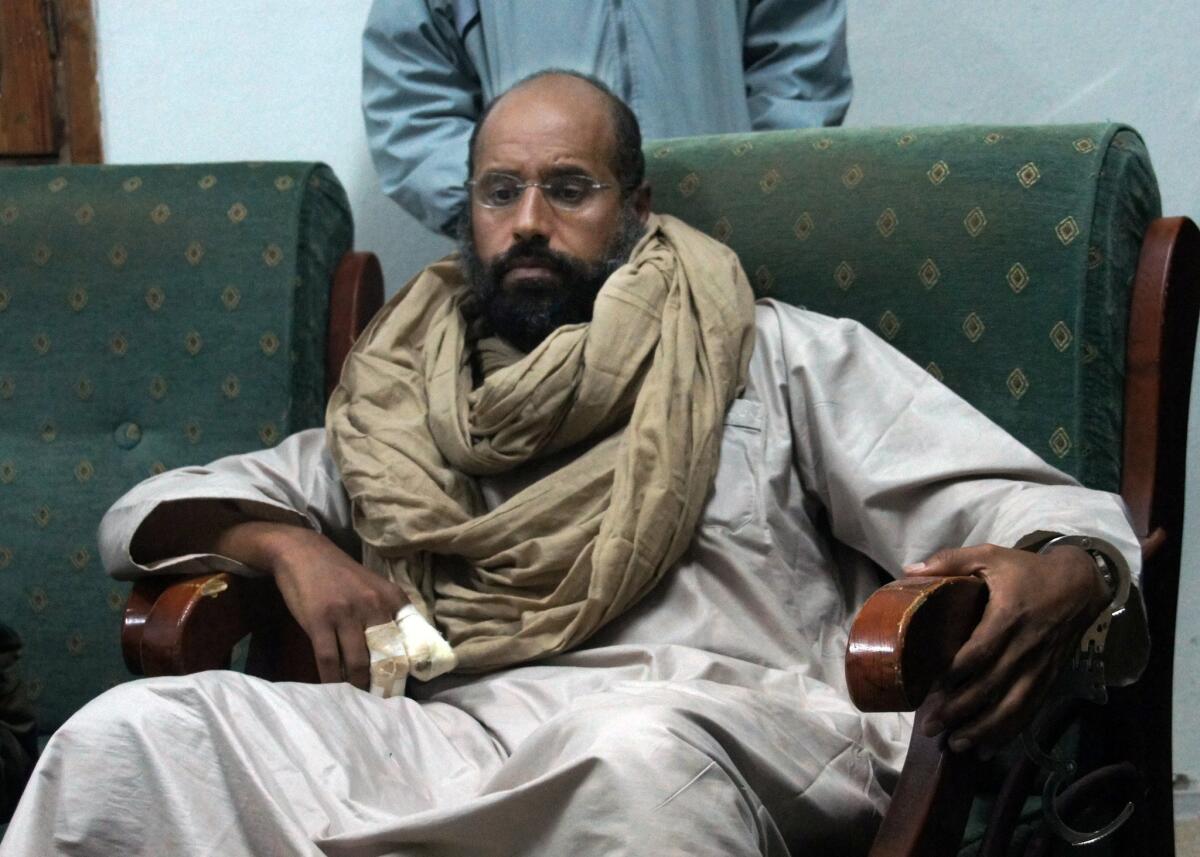Libyans shrug as Moammar Kadafi’s son is sentenced to death by firing squad

Seif Islam Kadafi on Nov. 19, 2011, after his capture by revolutionary fighters in Zintan, Libya.
- Share via
A court in Libya’s capital on Tuesday sentenced a son of the late strongman Moammar Kadafi, along with other members of his government, to death by firing squad for crimes committed during the 2011 war that toppled his father.
It was a ruling sought by millions of Libyans who had risen up against Kadafi’s repressive rule, but response in Tripoli was muted, news reports said.
The militiamen who captured Seif Islam Kadafi do not recognize the government and courts in Tripoli and have refused to hand him over.
Many Libyans long ago lost interest in the case, preoccupied by the tribal animosities, territorial disputes, extremist violence, economic turmoil and political disarray that have plagued the North African country since Kadafi was overthrown and killed after 42 years in power.
“Who cares about them anymore? Every Libyan knows they are guilty,” a customer in a cafe told the Libya Herald, an online daily. “We’re facing much more serious problems, like the lack of money, and terrorism.”
Seif Islam was captured in 2011 by a militia based in the northwestern city of Zintan that is allied with the internationally recognized government based in the eastern town of Tobruk.
A rival legislature sits in Tripoli, where the trial began in March 2014. Seif Islam took part in a few initial sessions via video link. But he has not been seen or heard from in more than a year, according to human rights activists.
He was one of nine Kadafi insiders sentenced to death Tuesday, including Abdullah Senussi, Libya’s longtime security chief, and two former prime ministers, Baghdadi Ali Mahmoudi and Abuzaid Dorda. Prison terms ranging from five years to life were handed to 23 people, four people were acquitted and one was referred to a psychiatric hospital, news reports said. All the sentences are subject to appeal.
International rights organizations condemned the trial, which they said was plagued by violations of due process, including a lack of meaningful representation for the accused and claims by lawyers that they were given insufficient time to mount a defense.
“The victims of the serious crimes committed during the 2011 uprising deserve justice, but that can only be delivered through fair and transparent proceedings,” Joe Stork, deputy Middle East and North Africa director for New York-based Human Rights Watch, said in a statement.
The Council of Europe said the case should have been turned over to the International Criminal Court at The Hague, which wants to try Seif Islam on charges of crimes against humanity.
Seif Islam was the reformist face of Kadafi’s government, a cosmopolitan intellectual who promised to bring democracy to Libya. But he was also an ambitious heir apparent who vowed that “rivers of blood” would flow when protesters inspired by the “Arab Spring” uprisings then sweeping the region took to the streets.
During the trial, he was accused of recruiting mercenaries, planning and carrying out attacks on civilian targets, and inciting followers to kill and rape, news reports said.
In the years since his capture, two rival governments and a number of militias have vied for control of Libya and its vast oil resources. Traffickers of arms, drugs and migrants have flourished. And militants allied with the extremist group Islamic State have taken advantage of the chaos to seize territory.
“There are serious questions about whether judges and prosecutors can be truly independent where utter lawlessness prevails and certain groups are unashamedly shielded from justice,” Stork said. “This trial was held in the midst of an armed conflict and a country divided by war where impunity has become the norm.”
For more international news, follow @alexzavis on Twitter
More to Read
Sign up for Essential California
The most important California stories and recommendations in your inbox every morning.
You may occasionally receive promotional content from the Los Angeles Times.











